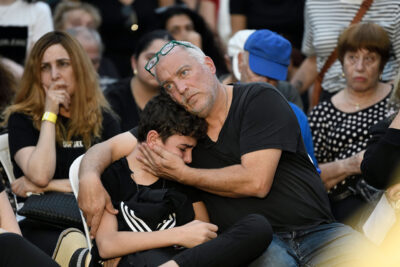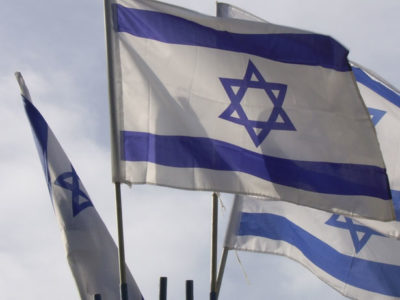Five Big Ideas For Approaching Disagreement:
Before engaging in controversial topics, set guidelines for a respectful and productive discussion with your class. Use these five big ideas from Dr. Noam Weissman’s op-ed, “The Simple Mindset Change That Would Transform the Israel-Diaspora Relationship,” published in the Jewish Journal, to prepare your students for this discussion.
- When it comes to the divide between Israeli and Diaspora Jews, differences in opinion is not the problem. Disagreement and debate are core values of our tradition.
“Differences in Jewish opinion is not the problem… we need to internalize and embrace this reality as part of our spiritual DNA. Healthy disagreement and civil debate are core values of our tradition. We know the rabbis of the Talmud held competing views. We know that rejected opinions are integral to our religious literature. And we know that while the medieval commentators, the Rishonim, agreed on most of the pillars of Judaism, they engaged in fiery debates about the chronology, historicity, and meaning of the Torah.” - We are unlikely to “convert” people from other cultures and groups to see things exactly as we do. Rather than try to convert one another, let’s try to understand one another.
“Trying to get American and Israeli Jews to see every issue in the same way not only runs counter to our tradition — it is Sisyphean. In ‘The Righteous Mind: Why Good People are Divided by Politics and Religion,’ Jonathan Haidt argues that people are ‘groupish’ in addition to being driven by (enlightened) self-interest. We promote our interests in competition with our peers, but we also promote our group’s interest in competition with other groups. We have been hardwired for this behavior through a few hundred thousand years of evolution, in which the more cohesive a group was, the more likely it was to succeed. We are unlikely to ‘convert’ members of other groups to see things the way our own group does… We need to accept that these two communities have different experiences and perspectives. Rather than trying to convert one another, let’s try to understand one another.” - Improving the relationship between Israeli and Diaspora Jews will take more than mutually understanding one another. We also need to rally around a common purpose and embrace our shared destiny.
“Haidt argues that to activate the 10 percent of our nature that is inclined to collaborate, we need to rally around a common purpose. To improve the relationship between Israeli and American Jews, we need to recognize our shared destiny and commit to working toward that future together. The reality is that as Jews, we have automatic membership in the Jewish people… Rabbi Joseph B. Soloveitchik captured this idea when he wrote that the Jewish people are bound by a ‘covenant of fate’ (brit goral) and a ‘covenant of destiny’ (brit yeud). The ‘covenant of fate’ refers to what happens to us as a collective Jewish community, regardless of where we live, who we vote for, and which synagogue we attend. The ‘covenant of destiny’ refers to our actions and the work the Jewish people are called to do together.” - There are both “prophets” and “guardians” within the Jewish community (in reality, most of us can relate to both perspectives). Although these two approaches can seem worlds apart, they make us who we are as a Jewish community.
“Years ago, Rabbi David Cooper of Kehilla Community Synagogue suggested that there are both ‘prophets’ and ‘guardians’ within the Jewish community. The priority of ‘prophets’ is to hold Israel and the Jewish people accountable for being a light unto the nations, call out oppression against all people, and build a future that is more just and compassionate. The instinct of ‘guardians’ is to ensure the security of Israel and the Jewish people, preserve our lives and traditions, and continue to have autonomy in our ancient homeland… Although these two perspectives can seem worlds apart, they make us who we are as a Jewish community. If we can accept that reality and people with different perspectives, then we will not only improve our coexistence — we will also strengthen one another and our communities as well. At the end of the day, the guardian and the prophet need each other. The guardian needs to be reminded by the prophet: ‘If we are only for ourselves, who are we?’ And the prophet needs to be reminded by the guardian: ‘If we are not for ourselves, who will be?’” - We are members not only of the American Jewish community or the Israeli Jewish community, but also of Knesset Yisrael. Let’s “zoom out” of our perspective to recognize that the way we see things is a vital and necessary part of the big picture and work together to build our shared future.
“We don’t need to change our fundamental views, but we must get out of our virtual and real-life echo chambers. Let’s ‘zoom out’ of our perspective to recognize that the way we see things is a vital and necessary part of the big picture… Soloveitchik’s covenants of fate and destiny still bind our entire community today. Having this awareness and being willing to work together to build our shared future is critical to Israeli and American Jews’ relationship. After all, we are members not only of the American Jewish community or the Israeli Jewish community, but also of Knesset Yisrael, with work that is meant for all of us to do together. If enough of us make this simple yet powerful switch in mindset, we will have a chance to heal this rift and work together to create a brighter future for the Jewish people.”
Dialectical Thinking: A Brief Introduction
When discussing contentious and controversial issues, it’s important to create an environment in which people can share and listen to diverse perspectives while displaying respect and empathy. A great tool to use in achieving this goal is dialectical thinking, as laid out by Heterodox Academy.
Dialectical thinking refers to the ability to view issues from multiple perspectives and arrive at a conclusion that reconciles seemingly contradictory information. The goal is not to be relativistic, nor is it a way to encourage people not to take a stand. Rather, this approach helps us take a more informed stand.
When discussing contentious topics, dialectical thinking is more likely to:
- Facilitate dialogue
- Find solutions
- Increase inclusion and empathy
- Help us understand one another
- Help us get along
Dialectical Thinking Exercise
Considering any controversial topic, think of three pros, three cons, and one uncertainty. You can apply this exercise to different policy issues in political elections, issues in the Israeli-Palestinian peace process, controversial issues in current events, and more. Try to come up with the best arguments from both sides. A pro supports the argument, a con argues against it, and an uncertainty is something that you are unsure of that doesn’t fit as a pro or a con.

After the dialectical thinking exercise, answer the following questions:
- Describe what it was like coming up with both pros and cons of an issue. Was it difficult to come up with arguments for the side you disagreed with?
- Was it difficult to acknowledge negative things about positions or people you normally identify with?
- Did coming up with the different arguments change your thinking about this issue at all? If so, how? Is there a position you are more open to considering than you were before?
- Now that you have completed this exercise and explored the different arguments, where do you stand on this issue?
- How often do you see news on social media, on TV or at school that reflects dialectical thinking, and how often do you see news that reflects all-or-nothing thinking? What practices could you use to apply dialectical thinking to that topic?



